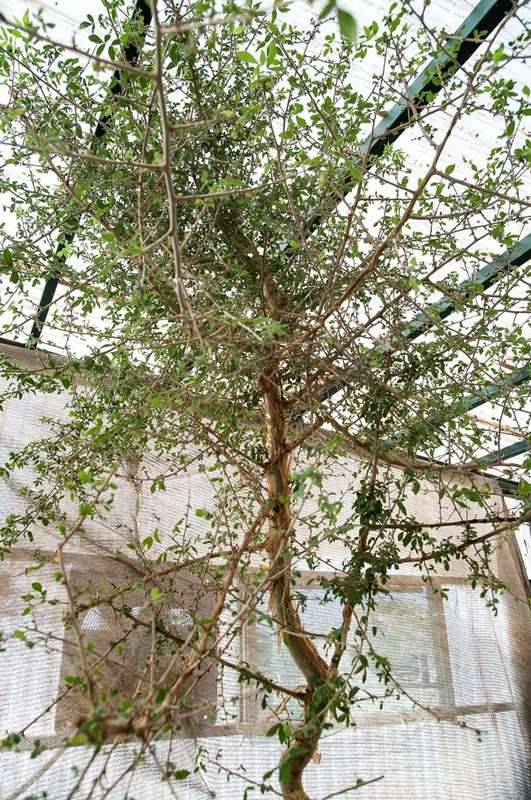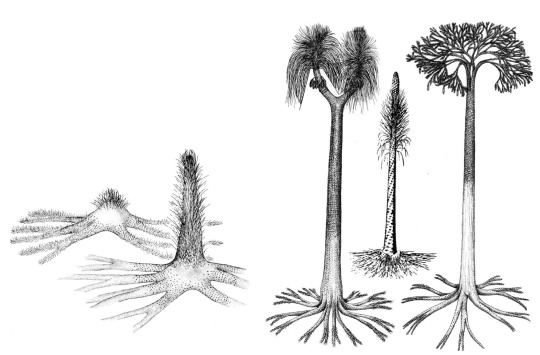#paleobotany
Explore tagged Tumblr posts
Text
if i had a partner i would wake them up right now and i would say babe wake up im thinking about the plants that went extinct in the kt boundary comet blast again. babe the world has ended 1 million times and i want to grieve for every single one of them and its really messed up except for immediately after the kt extinction event when the ferns had so much sex they left an observable stripe of spore-dense matter fossilized in the rock forever, like that part was kinda funny. i think i have a stmoach ulcer again btw
#paleobotany#thinkin about it again tonite. and also that one graph about it in that one book i have about it and i want to post it#but i need to hit the honk mimimimimi#basically imagine a bunch of black bars representing plant species and then a line where the comet struck and no more black bars#insanely sobering graph
9K notes
·
View notes
Text
"During an archaeological dig in a desert area north of Jerusalem 40 years ago, a seed was discovered which was determined to be in pristine condition but had obviously seen many a year.
Now, despite falling from its parent 1,000 years ago, it has grown into a mature tree, and botanists examining it believe it may be an extinct species that was used for medicinal purposes for thousands of years—even receiving a nod in the Bible.
Neither Israeli botanists, nor Dr. Sarah Sallon, a physician who founded the Louis L. Borick Natural Medicine Research Center at Hadassah University Medical Center in Jerusalem, could determine what species it was from simply from the seed covering. So they did what nature intended—they planted it.
Using a well-documented technique that saw 2,000-year-old date palm fruit pits germinate, Dr. Sallon soaked the seed in hormones, liquid fertilizer, and water, and then planted it in a pot of sterile seed; then waited.
Despite its genetic code being exposed to environmental stressors for over 1,000 years, the seed sprouted after 5 weeks. The shoot was protected by a caplike feature called an operculum. As the shoot grew, the operculum was shed—leaving something for the team to radiocarbon date. It narrowed down the age of the almost 10-centuries-old seed to between the years 993 an 1202.
Fast forward 14 years and the plant has become a 10-foot-tall tree. Dr. Sallon shared images of the tree, its bark, and its leaves with botanists around the world. One expert suggested it belonged to the genus Commiphora, found across the Arabian Peninsula and parts of Africa. A genetic analysis subsequently revealed this was the case, but a perfect match was lacking.

Pictured: The tree, now 14 years old.
Dr. Sallon and her team thought it was an extinct species known from history as Judean Balsam, but the best way to confirm that suspicion would be to have some aromatic traces similar to the resins of the myrrh tree to which it is related. However, no such fragrant compounds were detected.
Instead, the chemical analysis of the leaves identified a group of phytochemicals known as guggulterols which have been observed in a related species called Commiphora wightii that’s known to possess certain cancer-fighting properties in its resin.
A medicinal balm, the origin of which is not known, is mentioned in multiple historical texts including the Bible as ‘tsori,’ and rather than the fragrant Judean Balsam, it’s this tsori that Dr. Sallon and her team believe they have found.
They must wait until the tree, now 14 years old, produces flower or fruit to know for sure if it’s an extinct species, and if so, how to perhaps keep it alive.
Dr. Louise Colville, senior research leader in seed and stress biology at Royal Botanic Gardens, Kew, in London who wasn’t involved in the research, told CNN that it was a major accomplishment to grow a seed that old and possibly lead to a resurrection of this Biblical botanical.
“What’s surprising in this story is it was just a single seed and to be able to have one chance for that to germinate is extremely lucky,” she said.
“Working in a seed bank, seeing the potential for that extreme longevity gives us hope that banking and storing seeds that some at least will survive for very long periods of time.”"
-via Good News Network, October 8, 2024
--
Note: This is such a good demonstration of why seed banks are so important!! They give us such real and massive hope for deextinction and the revival of endangered species.
#botany#plant biology#endangered species#extinct species#deextinction#ancient medicine#jerusalem#biblical#medicinal plants#seeds#seed bank#good news#hope#paleobotany
9K notes
·
View notes
Text


Here is my recent painting of the Otway Basin, Australia, during the late Albian. It is the second of two artworks I created for Vera Korasidis and Barbara Wagstaff, at The University of Melbourne. They both took weeks to create, for this paper: https://www.tandfonline.com/doi/full/10.1080/03115518.2025.2489614?fbclid=IwY2xjawKRPbpleHRuA2FlbQIxMABicmlkETFrSHpaVklhVnNjOGVLRVlxAR70NFx_Cd7x96VYZULSPsGbqjXloyQx83bBsY2CGbXtoPvaYP8Asmc3LRmC7A_aem_mY098CXYMG0h8LI8Ww2DxQ#abstract. Please enjoy the details, they required a lot of work!
#Art#Painting#PaleoArt#PalaeoArt#SciArt#SciComm#DigitalArt#Illustration#Dinosaurs#Palaeontology#Paleontology#Megaraptor#WildlifeArt#PaleoPlants#PalaeoPlants#Paleobotany#Palaeobotany#Cretaceous
193 notes
·
View notes
Text

I was very much looking forward to this #paleostream! The tranquil of the Devonian Rhynie Chert fascinated me for a while. This geothermal wetland preserves some of the specimens of early landplants and is witness to the conquest of land by animals.

There was quite a bit of back and fourth in finding this composition. for once it turned out that the Prototaxites specimens from here are all quite small, also putting the camera down on the ground or underwater would have meant to loose sight of the colorful geothermal spring.


These geothermal springs are the reason for the exquisite preservation at Rhynie, regular flooding covered the local flora and fauna in silica, encasing in glass basically. This ensured that organisms were preserved down to cellular level and often time in situ.


Another challenge with this piece was how small the fauna from here is. Only a few creatures could be included here just by vertue of these early land arthropods being minuscule.
But I for once was more interested in the plants anyway.
281 notes
·
View notes
Text
#Paleostream 31/05/2025
here's today's #Paleostream flocking sketches!!!
today we sketched Himalayasaurus, Typothorax, Lunataspis (i drew L. aurora), and Kunpengopterus (drinking the nectar from a Weltrichia)




#Paleostream#sketches#paleoart#digital art#paleontology#digital artwork#artists on tumblr#palaeoart#digital illustration#sciart#id in alt text#ichthyosaur#Himalayasaurus#archosaurs#aetosaur#Typothorax#horseshoe crab#Xiphosura#Lunataspis#Lunataspis aurora#pterosaur#Kunpengopterus#plant art#paleobotany#Bennettitales#Williamsoniaceae#Weltrichia
85 notes
·
View notes
Text

Commission for Dahyraptor from Bsky!
#paleoart#prehistory#dinosaurs#dinosaur#dinosaur oc#feathered dinosaurs#raptor oc#feathered raptor#raptor character#dinosaur art#dino art#dino oc#dinosaur commission#feral oc#feral commissions#dromaeosaurid#dromaeosaurs#theropoda#theropod#cretaceous#paleobotany
63 notes
·
View notes
Text

New study that has yet to be peer reviewed asserts that the prototaxites - the first giant land dwelling organisms, might actually not be a type of fungus as previously thought, but instead belong to an entirely new undiscovered and extinct kingdom.
They could be up to 8 meters tall and looked like silly sticks :]

59 notes
·
View notes
Text

Crinoid colony, Location: Baden-Württemberg (Germany)
Age:about 195 Million years old - lower Jurassic (Toarcium)
The 4 x 5 meters specimen is now on display in Houston.

For the record, actress Margaret Sullavan was not, despite what Wikipedia might claim, a crinoid. Probably.
107 notes
·
View notes
Text

Played the isle yesterday, had kids with a friend and one of em got snatched by a deino so i decided to draw it 😭
#art#artists on tumblr#drawing#digital art#lizardator rw#oc art#oc#paleo art#paleoblr#paleobotany#paleontology#dino#dino art#dinosaur art#hadrosaur#hadrosauridae#maiasaura#the isle#the isle fanart#fanart#deinosuchus
52 notes
·
View notes
Text
I returned to a Pennsylvanian (late Carboniferous) site I had visited a few times and I finally found some Sphenophyllum!


EDIT: I talked to a paleobotanist and according to him, this is actually Asterophyllites. (I don't buy it though. If anything, it would be Annularia, and the leaves lack a central midvein.)
EDIT 2: Check the reblogs for more fossils from this site!!!
#paleobiology#paleontology#paleoblr#paleobotany#geoscience#geology#plants#evolution#carboniferous#pennsylvanian#horsetail#Sphenophyllum
36 notes
·
View notes
Text
The unique underwater kelp forests that line the Pacific Coast support a varied ecosystem that was thought to have evolved along with the kelp over the past 14 million years. But the new study shows that kelp flourished off the Northwest Coast more than 32 million years ago, long before the appearance of modern groups of marine mammals, sea urchins, birds, and bivalves that today call the forests home.
Continue Reading.
284 notes
·
View notes
Note
we talked about isoetales in my paleobotany class today and like. what the fuck man. theyre awesome but like. why are/were any of them doing it like that. tbh we should be very impressed that any of the scale trees ever managed to live long enough to reproduce when their growth crushes the phloem over time
my psychiatrist: the lepidodendron saplings that grow upwards from an lump in the ground instead of starting as a small plant that gets proportionally bigger are extinct now, they can't hurt you
the saplings in question:

#dude. im just thinking about them again#and also reading more about the unifacial cambium because tbh i did not know this particular twist#this actually might explain my prismatic tissue question as well#dude how DID these things survive and more importantly why are modern trees the ipads of trees apparently#paleobotany#isoetes#asks#plont asks
1K notes
·
View notes
Note
I read the sign in your last post. So, did lichens come before plants in the evolutionary timeline?
Ah I see what you are saying. No, lichens likely didn't come before plants in the evolutionary timeline. Fossil records indicate they show up much later. What that sign is referring to when it says "Beginning of Life" is that lichens are the first to colonize bare rock in our modern world. How did soil form for our earliest terrestrial plants (likely bryophytes, which are also primary colonizers) before lichens existed? It was probably a very, very long process along coastlines where erosion and oceanic deposition played a major role. This is by no means my field of study, but it is a fascinating question: When did lichens step in as key colonizers in primary succession?
62 notes
·
View notes
Text





Some zooms into my recent painting of the Gippsland Basin, Australia, during the early Aptian. Commissioned by Vera Korasidis and Barbara Wagstaff, at The University of Melbourne, for their paper: https://www.tandfonline.com/doi/full/10.1080/03115518.2025.2489614?fbclid=IwY2xjawKQTetleHRuA2FlbQIxMABicmlkETFrSHpaVklhVnNjOGVLRVlxAR4RdYgK3EWDbj1JfgNiDKEhUX5v1CNWob6oMPILGDPupUE6bjvnzKPwa1z22w_aem_JWsQ7OQU7Nu_ks4QQxkETw#abstract
#Art#Painting#PaleoArt#PalaeoArt#SciArt#SciComm#DigitalArt#Illustration#Dinosaurs#Birds#Pterosaurs#Reptiles#MarineReptiles#Palaeontology#Paleontology#Megaraptor#WildlifeArt#PaleoPlants#PalaeoPlants#Paleobotany#Palaeobotany#Cretaceous
95 notes
·
View notes
Text

I have absolutely no commentary to this just sheer amusement at this genus of fossil plant I just learned about during research
524 notes
·
View notes
Text
378 notes
·
View notes